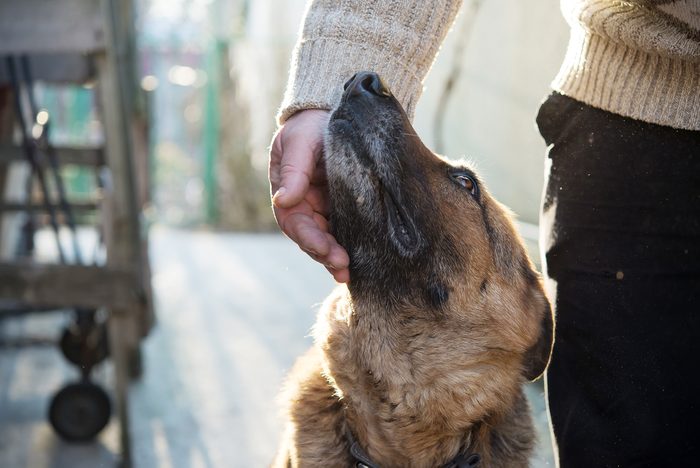
That dog’s really going to love you
Okay, okay, all kinds of dogs love their people. This is not exclusive to shelter dogs. But it’s easy to project an extra-special feeling of gratitude and joy onto a grateful, happy dog who really needed you. “I think if you adopt a dog who’s had a less than perfect life, they are the ones who appreciate it the most when you give them a wonderful life with the attention, food, love, and training they crave,” says Trish McMillan, a professional dog trainer who spent nearly eight years working with the ASPCA’s New York City shelter and currently co-chairs the International Association of Animal Behavior Consultants’ Shelter Division. Don’t miss these 50 secrets your pet won’t tell you. Plus, the annual Puppy Bowl showcasing some adorable rescue pups.
If you’re passionate about pets, don’t forget to also check out these dog rescue videos.
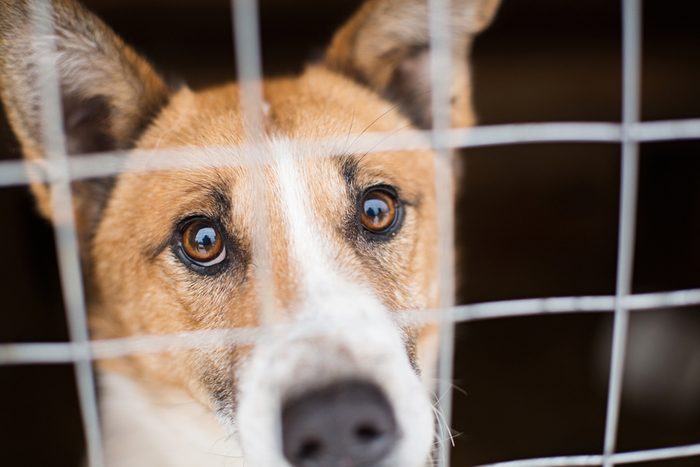
You’re helping dogs
When you adopt from a shelter, you’re giving a great home to a dog who needs one, but you’re also freeing up the facility and its people to care for more animals that need help. Plus, every dog that isn’t purchased from a puppy mill means there’s less incentive for irresponsible breeding, according to the Humane Society. “Puppy mill dogs have higher rates of inherited and infectious diseases, and the mothers of these puppies often suffer from inhumane breeding practices and inadequate care,” says Elizabeth Berliner, DVM, director of Maddie’s Shelter Medicine Program at Cornell College of Veterinary Medicine. (The Humane Society website has resources for finding good dog breeders, if that’s the route you decide to take.) These are the things your dog wishes you knew.

You can skip the puppy stage
Lots of dogs in shelters are adults that have already spent time living with other families—often successfully. Nashville Humane Association executive director Laura Chavarria says about half the animals surrendered to her shelter come from families that can’t find pet-friendly housing, and others are brought in because of owners’ medical conditions or life changes. “The majority of the dogs that come to our facility do so because of issues in their humans’ lives,” she says. “These issues are beyond the dog’s control.” Because they’ve matured past the puppy stage, adult dogs are less likely to chew shoes and dig up your garden.

Many shelter dogs are already house-trained
Lots of adult dogs have been through the potty-training process, so they already know not to do their business in the house. That said, any dog dealing with a new living situation might be prone to accidents while they get their bearings, but at least adult dogs are physically capable of going a few hours between potty breaks; the Humane Society says that puppies can typically only be expected to wait an hour for every month of their age, so a six-month-old pup will definitely require nighttime outings. These are habits you have that vets wish you would quit.
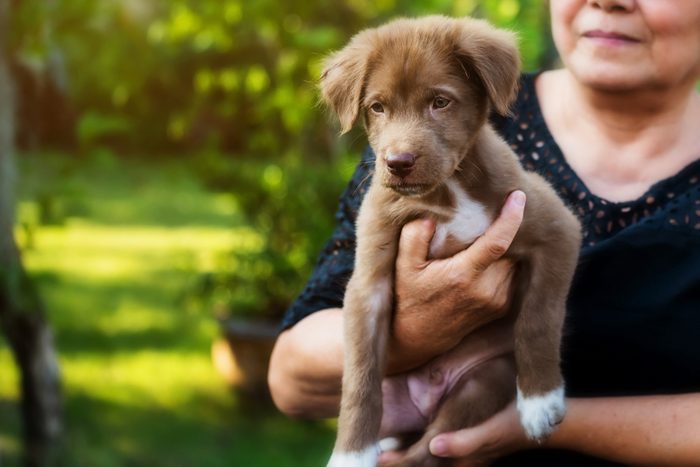
You can adopt a puppy
If you really want to bring home a youngster so you can play a strong role in socializing and training it early on and get all those warm cuddles, you can still adopt. Chavarria says her shelter gets “oops” puppies from unspayed female dogs: “We see a lot of pregnant mother dogs or nursing moms that enter our adoption center.” Chavarria adds that the Nashville Humane Association has foster teams that take care of the puppies and mama dogs until they’re healthy and old enough to go out to adoptive families. Berliner confirms that puppies are often available for adoption. “It sometimes takes a little time and patience to find the one for your family, but shelters are a great place to get a new puppy,” she says. These are the 15 things you need before bringing a new pup home.

You can adopt a senior dog
On the other end of the spectrum, if you’re looking for a companion who doesn’t need intensive exercise sessions, you might want to consider adopting a senior citizen. Berliner says that she’s taken home several older dogs herself. “Many shelters work hard to screen senior pets more thoroughly for conditions of aging, provide more extensive care to prepare them for adoption, and take pride in finding them homes,” she says, adding that these dogs often “provide fantastic companionship for quieter households, single people, and families.” (While you might be worried about high vet bills for seniors, it’s important for all dog owners to know that animals can surprise you at any age with expensive medical conditions—youth is no guarantee of good health.)

You can even adopt a purebred dog
If you have your heart set on bringing a specific breed of dog into your life, you can still start by checking local shelters. “In my ten years of experience, I’ve seen full-blooded bulldogs, Chihuahuas, and Labradoodles available for adoption!” Chavarria says. If you don’t find what you’re looking for, check out breed-specific rescue operations—the American Kennel Club’s website has links and contacts for organizations that re-home dogs from Affenpinschers to Yorkies. These are the 18 best dog breeds for kids.
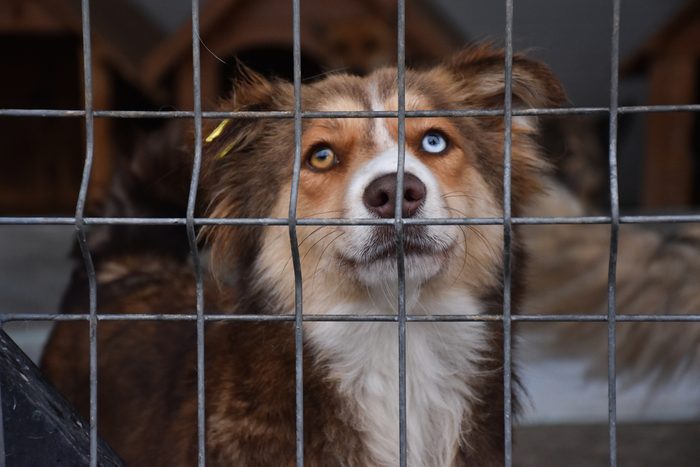
Mixed breeds are great too
Although responsible breeders have had success in recent decades with reducing and eliminating some breed-specific genetic problems from their dogs (including one disorder that led to blindness in border collies and another that caused anemic disease in beagles), purebreds are still slightly more likely to have genetic disorders than mixed breeds, according to a 2018 study published in PLOS Genetics. “In general, mixed-breed shelter dogs tend to have fewer inherited genetic health problems compared with dogs from breeders,” Chavarria says. Check out what the cutest dog breeds look like as puppies.

You might have the opportunity to foster
Many shelters need volunteers to host dogs temporarily, which can both make space in the facility and also give those dogs a chance to show how they’ll behave in a home environment. “It can also provide an ‘out-of-the-shelter’ option for a dog that is not doing well in a shelter facility, or that has special behavioral or medical needs,” Berliner says, adding that many volunteers come to love fostering dogs. In the process, you might just find the dog you want to adopt permanently. Even if you’re not interested in fostering, many shelters will let you spend significant amounts of time with a dog you’re interested in. “Folks can come and ‘check out’ a dog for four hours during the day and have a Doggie Date,” Chavarria says about the Nashville Humane Association. Check out these 50 things that make your pet tick.
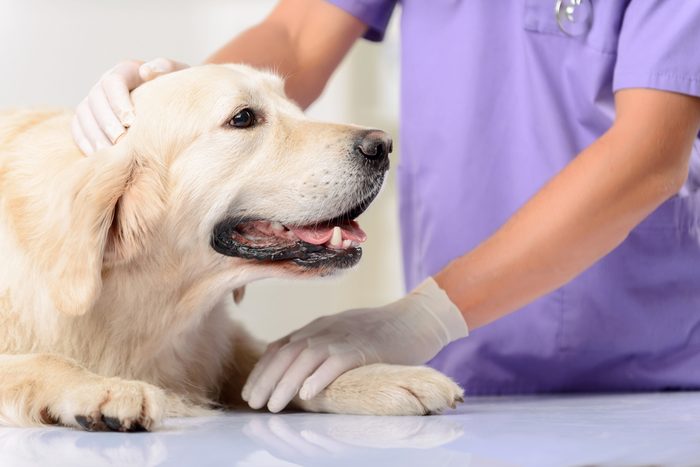
Shelter workers can tell you a lot about the dogs
Don’t rely solely on your own instincts when you’re meeting dogs—staffers and volunteers at shelters and rescue organizations will have lots of information to share with you about their personalities, health, and behavior quirks. “Many shelters work hard to ask questions about adopter expectations and lifestyles and endeavor to match adopters with dogs that would seem to do well in their homes,” Berliner says. They’ll also have information about the dogs’ past situations and if they have lived in homes before (with previous owners or in foster care). Staffers might also have some idea about how they get along with kids and cats, and about whether they get anxious when left alone or bark when they’re stressed. Don’t hesitate to ask lots of questions. These before-and-after dog adoption photos will melt your heart.

Shelter dogs are cheaper than dogs from reputable breeders
Adoption fees at shelters are typically less than $500 (often much less). Many organizations charge their higher fees for puppies and purebred dogs that are in high demand and lower ones for senior dogs or those with medical or behavior challenges. Plus, “many shelters have adoption specials or fee-waived adoptions when they get too full,” says McMillan. “I adopted both of my cats during specials like these, and they’re amazing pets.” Some shelters and rescue groups are registered non-profits, which means your “donation” to adopt your pet may even be tax deductible. Obviously, you’re avoiding purchasing puppy-mill dogs from pet stores, flea markets, and classified ads, so the real price comparison is to reputable breeders, whose puppies often cost thousands of dollars. These are the things your dog wishes you’d stop doing.

Most shelter dogs have already been “fixed”
Adoption fees are even more of a bargain when you consider that most shelter dogs are spayed or neutered before they come home with you. This procedure can cost a couple hundred dollars if you pay for it yourself, but it’s vital to keeping pet populations under control, and it’s required by law in some states. “In shelters that don’t have the resources to do this, it’s advised that they ensure new owners do spay and neuter by providing vouchers or collecting deposits that incentivize this process,” Berliner says.
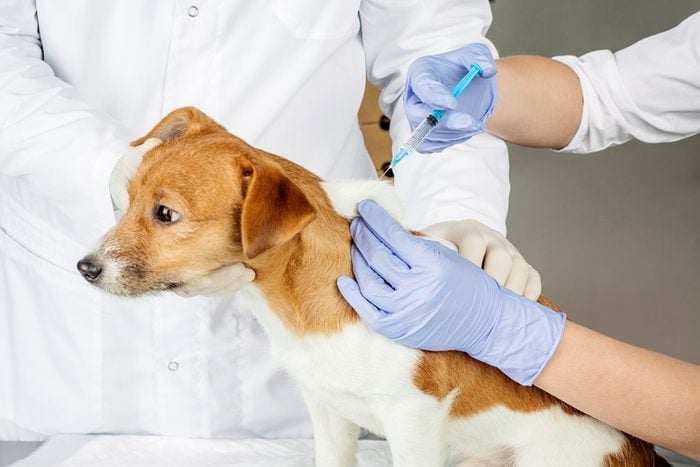
Shelter dogs have had their shots
Animal shelters vaccinate the dogs that come in so they’re protected from diseases that can circulate around the facility. You’ll need to keep up with their shots once you bring them home (most dogs need boosters every year), but a dog adopted from a shelter should be ready to mingle with other pups in your neighborhood right away. “There are standards of care set out by the American Veterinary Medical Association and state laws that require what vaccinations shelter animals should receive—rabies vaccinations, especially,” Chavarria says. Here’s how male and female dogs are different.

Lots of shelters even microchip dogs
A microchip is a tiny electronic chip enclosed in a glass cylinder about the size of a grain of rice, according to the American Veterinary Medical Association, that’s implanted under the skin of your pet. Then, if he or she ever wanders off and is found by a stranger, a veterinarian or shelter staffer can run a scanner over the chip and get access to your contact information to let you know where Fido ended up. “Most of the larger, progressive shelters provide a microchip at the time of adoption, but there are still shelters out there that do not have the resources to include that in the adoption packet,” Chavarria says. (If your shelter doesn’t implant a microchip in dogs, consider having your vet do it—the procedure is easy and inexpensive.) Be sure to avoid these 53 mistakes even smart dog owners make.
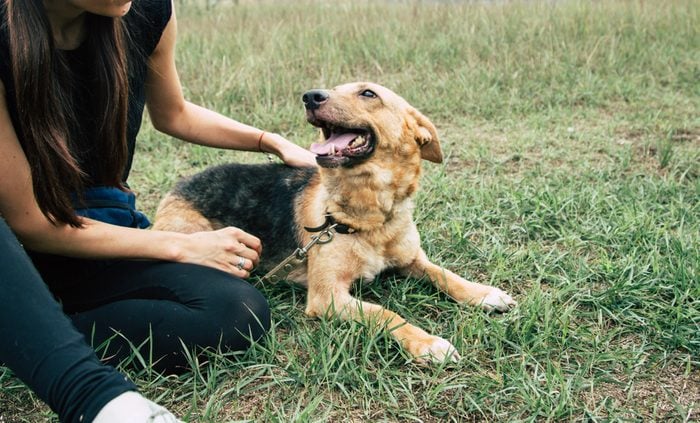
Even if you’re not ready to adopt a dog, you can spend time with them by volunteering at a shelter
If you love dogs and want to be around them and help them, but you’re not quite ready to take the plunge and adopt your own, consider volunteering to walk dogs or take on other chores at a local facility. “Shelters always need volunteers,” McMillan says. “Fun, encouraging adoption profiles need to be written, pictures and videos need to be taken, enrichment items need to be packed with food and treats, and—boy oh boy—there’s always laundry, cleaning, and bathing to be done.”
Sources:
- Humane Society: “How to find a responsible dog breeder”
- Humane Society: “How to housetrain your dog or puppy”
- American Kennel Club: “AKC Rescue Network”
- Psychology Today: “Are Mixed-Breed Dogs Really Healthier Than Purebreds?”
- PLOS Genetics: “Frequency and distribution of 152 genetic disease variants in over 100,000 mixed breed and purebred dogs”
- AVMA: “Microchipping of Animals FAQ”